- Home
- Richard Lee Byers
Whisper of Venom: Brotherhood of the Griffon, Book II Page 3
Whisper of Venom: Brotherhood of the Griffon, Book II Read online
Page 3
Halonya started weeping and dropped back onto her knees. “Thank you, Majesty! I love you! I won’t let you down!”
“I know,” Tchazzar said. “Now, I wish to acknowledge someone else who has done me great service. Jhesrhi Coldcreek, come forward.”
Tchazzar hadn’t warned Jhesrhi he meant to do that. She suddenly felt intensely awkward, and Gaedynn’s sardonic smile made the sensation worse. Somehow she managed to walk the several paces to the war hero’s side without tripping or otherwise disgracing herself.
“As some of you know,” Tchazzar said, “this woman is a wizard. And after she … used her magic to my benefit, I offered her a boon. She could have asked for a title, wealth, and land, but she didn’t. She asked me to correct a long-standing injustice, and so I shall.
“I hereby rescind all laws that apply only to folk possessed of arcane abilities. Henceforth, sorcerers need not have their palms tattooed. They can live where they like, assemble as they like, and practice their arts as they like, provided they do no harm. Priests and scholars are forbidden to teach the false and pernicious belief that all arcane magic derives from the lower worlds, and those who seek to persecute warlocks and wizards will face severe reprisals.”
No one cheered for that declaration either. Jhesrhi supposed that in its way it had shocked the assembly as much as Tchazzar’s unequivocal claim to godhood, and was surely less popular. Luthcheq had always loved to hate her kind. Well, choke on it, you ignorant bastards, she thought.
“There will be more new edicts in the days to come,” Tchazzar said. “Bold new ideas and ventures to make Chessenta into the great land it was always meant to be. But for now, celebrate my ascension! Your lord has provided for your needs. You’ll find food and drink on every corner, and musicians, jugglers, and players performing for your amusement in every street!”
That got them clapping and shouting again. Tchazzar turned in a swirl of scarlet cloak and headed into the War College.
As Aoth followed Tchazzar into the fortress, he made psychic contact with Jet. Everything all right? he asked.
If that strutting jackanapes is a god, the black griffon replied, the world is even worse off than I thought.
Aoth snorted. I have a more specific criticism of his performance. But I’ll be sure to give him your opinion.
Once through the doorway, he found that Tchazzar had stopped on the other side to accept congratulations. Trampling the rules of protocol, Zan-akar Zeraez, the Akanûlan ambassador, had somehow managed to make himself first in line. Maybe everyone else had hesitated to crowd the genasi for fear of the sparks that crawled and popped on his deep purple, silver-etched skin.
While Aoth waited his turn, Nicos Corynian approached him. Trimly built, with a broken nose and a cauliflower ear that bespoke the Chessentan enthusiasm for the more violent forms of athletic competition, Nicos was in theory the Brotherhood’s patron, although the relationship was slightly muddled. The nobleman had hired the sellswords to serve the crown, and Shala had in fact accepted their service in due course.
And now she wasn’t the monarch anymore. Aoth sighed and wondered why nothing was ever simple.
“I’m sorry the war hero didn’t mention you during his address,” he murmured. “I trust he’ll prove more appreciative in private.”
Nicos shrugged. “He didn’t mention you either,” he replied just as softly, “or your man Ulraes, although I gather he had as much to do with the rescue as the wizard. I assume it’s because we’re not supposed to talk about the fact that His Majesty needed to be rescued.”
“That’s fine by me,” said Aoth. “We want the troops to think he’s invincible. They’ll fight better.”
Smiling, Tchazzar turned in their direction. “What did you think of my little oration?”
“It was inspirational,” Nicos said.
For a heartbeat Aoth wondered if it wouldn’t be better to say something just as empty and let it go at that. Then he decided, to the Hells with it. He was a soldier, not a courtier, and he’d talk like what he was, especially with Chessenta facing war.
“You said some things I didn’t expect,” he said, “and left out one thing I did.”
Tchazzar smiled. His teeth were white and even, as flawlessly handsome as the rest of him. “I was addressing my children for the first time in a hundred years. I had to speak my heart, even if it meant deviating from the script.”
“I understand that, Majesty. But I thought you were going to tell everyone that the creatures behind the Green Hand murders weren’t really dragonborn at all, but rather fiends conjured from the netherworld.” By the Black Flame, he and Cera had damn near died penetrating that particular secret!
“Unfortunately,” Tchazzar said, “it isn’t always possible to address every topic of interest in a single speech.”
“I understand that too. But this particular topic is important. At a time when Chessenta needs friends, you could have reestablished the alliance with Tymanther.”
“Tymanther has its own problems,” Tchazzar said. “They won’t be lending us troops anytime soon.”
“Still, it might hearten the people to know they don’t truly have enemies lurking across every border.”
“Perhaps at the cost of rekindling their suspicions of those they were originally inclined to blame—the mages. Which would violate the spirit of my pledge to Lady Jhesrhi.”
A pledge she exacted without consulting me, Aoth thought bitterly.
Not that he didn’t agree with it in principle. How could he not, considering that he was a war-mage himself? But the Brotherhood hadn’t come to Chessenta to spread justice and enlightenment. After two brutal campaigns that had diminished their ranks, produced little profit, and tarnished their name, they’d come to fill their coffers and rebuild their reputation fighting the country’s wars. And it wouldn’t help to have the people at large blame them for an unpopular edict.
“And now, if you’ll excuse me …” Tchazzar said. He was already turning and smiling at Luthen, Nicos’s chief political rival.
Gaedynn was the son of minor nobility and knew how to behave like a gentleman when it suited him. In some parts of Faerûn that meant gorging on whatever viands the host provided, to show appreciation for his largess. In Chessenta, with its mania for physical fitness, a fellow made a good impression by merely picking at the refreshments or ignoring them entirely.
But that night, he didn’t care. He and Jhesrhi had spent a hard, hungry time of it trapped in the Shadowfell. He’d be in the field soon, where the timing and quality of meals were always uncertain. Accordingly he meant to eat as lustily as Khouryn would in his place. And if his voracity repulsed any ladies worth charming, then he’d just have to try a little harder.
He had the lackeys behind the serving tables heap his plate with suckling pig, chicken breast with blueberry glaze, peas, buttered dark rolls, and slices of candied peach. His mouth watering, he turned away from the buffet, then froze.
Jhesrhi had come up behind him, but not a Jhesrhi he’d ever seen before. Some maid—or more likely a whole squad of them—had arranged her golden hair in an intricate coiffure and dressed her in a scarlet brocade gown. Rubies glittered on her earlobes and around her neck. Her attendants had even managed to pry the staff out of her hand.
“Good evening, milady,” he said. “You bear an uncanny resemblance to a wizard of my acquaintance. But she shuns occasions such as this.”
Jhesrhi scowled. “I couldn’t shun this one. The war hero told me to come and gave me this … outfit to wear. He wanted me to have myself announced too, but that was too much. I came in one of the side doors.”
Gaedynn grinned. “Well, you arrived before the dragon, so he’ll never know about your breach of protocol.”
Jhesrhi hesitated. “I’ve never worn anything like this. Does it look all right?”
She looked ravishing, but he realized he didn’t want to say so. Maybe it was because they’d already gone down the road of compliments and fon
d blandishments and found out that for them, it led nowhere at all.
“The important thing,” he said, “is that after tonight, you’ll be able to sell it all for a tidy sum.”
Something moved behind her amber eyes, and he wished he could take his answer back. Then the trumpeters blew a brassy fanfare, and, attired in crimson velvet and cloth of gold, Tchazzar came through the high arched doorway at the end of the room. The open leaves framing the entrance sported carvings of high points from the dragon’s previous reigns.
The men bowed and the women curtsied. Tchazzar beamed and gestured, signaling everyone to straighten up. Then he turned and nodded to the musicians, who struck up the first dance, a galliard.
Standing near the buffet, Gaedynn and Jhesrhi were already removed from the dance floor. But she took a reflexive step backward anyway.
Then Tchazzar shouted, “Stop!” His voice shouldn’t have cut through the galliard. But it did easily, as though he still carried a dragon’s roar within his seemingly human throat to use when necessary. The orchestra stumbled to a halt. The couples who were waiting for the war hero to choose a partner and start dancing so they could do the same peered at him in surprise.
“When last I walked these halls,” said the dragon to the conductor, “the dance in fashion was the longing. Or as some called it, the tease. Do you know it?”
The orchestra leader was a stooped little man with a pinched face. Gaedynn might have thought he looked more like a miserly shopkeeper than an artist, except for the zest that lived in his bright gray eyes. “No one has asked for that one in a long while, Majesty. But yes, we do know it. Or at least the older players do, and the rest can join in as they catch the sense of it.”
“Then let’s have it,” Tchazzar said, “and I’ll teach the steps to those who care to learn.”
The conductor smiled and switched the index finger of his offhand back and forth, telling his associates how quick he intended the beat to be. Then he raised his baton and swept it down. As promised, about half the musicians immediately began a lively tune in three-quarter time. The harper joined in a couple of measures later.
Meanwhile, Tchazzar walked straight toward Jhesrhi. When she saw him coming, she blanched.
“My lady,” he said. “Will you do me the honor?”
“I’m sorry, Majesty,” Jhesrhi said. “I can’t. I never have. Never in my life.”
“Neither has anyone else,” the dragon said. “Not this dance. You’re all starting even. What’s more, it’s a dance where the lady and gentleman don’t touch. Not even a brush of their fingertips, not even once. So please, won’t you give it a try?”
And to Gaedynn’s astonishment, she did. After a while she even smiled.
Something was weighing in his hand. He looked down at his heavily laden plate and realized he didn’t want it anymore.
Balasar woke suddenly from a sound sleep to the darkness of his bedchamber. At first he had no idea why. Then he heard, or perhaps merely sensed, a voice calling his name. It was less like speech than the whisper of a breeze, but somehow he understood it anyway.
It was undoubtedly the summons that Nala had promised would come. Plainly magical, it likely had something to do with the fuming, sour potion she’d given him to drink.
He threw off his blankets, dressed quickly, strapped on his broadsword, and slipped a dagger into his boot. He was supposedly going to the Platinum Cadre as a supplicant. But he’d feel like a jackass if they figured out he was actually a spy and managed to kill him because he hadn’t hidden a weapon on his person.
The common areas of Clan Daardendrien’s suite were deserted. Even the doorman was snoring. Balasar slipped out without waking him. The phantom voice whispered again, urging him toward the stairs that led downward.
As it turned out, he had to tramp all the way down to the floor of the City-Bastion’s central atrium, where fountains gurgled and shrubs and verdure grew in planters and flowerbeds. Striped and studded with balconies, the walls soared to the loft that served as the barracks of the Lance Defenders and the roost for their giant bats. The ambient magical glow was almost nonexistent at that hour, as conducive to sleep as the natural darkness outside.
The voice led Balasar down again, out into the cold night air. Onto the Market Floor, the pillared open space between the half pyramid above and the granite block below. Points of yellow light shined in the gloom, and somewhere to the north a longhorn whined. Clearly some of the taverns were still open, and for a moment Balasar dared to hope that Nala had summoned him to a meeting in such convivial surroundings.
Alas, no. The whisper—he still couldn’t judge if it existed only in his head—led him to another staircase, one descending into the bowels of the stone cube that formed the foundation of Djerad Thymar. Into the Catacombs.
The warren of tunnels and chambers contained storerooms, foundries, and other well-traveled areas with mundane and legitimate functions. They also held burial crypts and, according to rumor, desolate sections where outlaws conducted illicit business, fugitives went to ground, and specters walked.
Balasar sighed because he suspected he knew in which sort of precinct the priestess of the dragon god had set up shop. Sure enough, the voice called him into a narrow, snaking side passage and then down a steep and treacherous ramp. Most of the globular magical sconces had gone out, either because of time and neglect or because someone had taken the trouble to extinguish them.
Eventually he came to a point where the darkness was all but absolute. There might be a faint glimmer somewhere up ahead, but it could just as easily be a trick his light-starved eyes were playing on him.
Running the claws of his right hand along the wall, he pushed on. After what seemed a long time, he traversed an oblique bend in the passage, and then the light finally brightened. It led him into a bare pentagonal chamber where four dragonborn waited. Hoods of silvery cloth concealed their heads.
But not quite well enough. A big male with red scales had three chains dangling visibly from the underside of his jaw. They were the piercings of Clan Shestendeliath—and enabled Balasar to identify Patrin.
He almost grinned. The clandestine meeting with masked, silent cultists was clearly supposed to seem ominous, and it did. But he found it difficult to believe that the paladin of Bahamut intended any treachery or harm. Though misguided, Patrin was honorable, and he and Balasar had battled the ash giants side by side.
Still, his voice was steel and ice as he asked, “Who comes?”
Balasar gave the ritual response Nala had taught him. “A seeker of truth.” Just not the truth you think.
“What will you give to learn it?”
“All that I have and am.”
“Then strip him,” Patrin said. The other worshipers moved forward.
Balasar had to force himself to stand still and submit to the subsequent rough handling. No one had warned him about that part of it.
For a time Aoth savored the glow of contentment, the feeling of utter, spent relaxation. Then, without him willing it, his mind resumed gnawing at all the matters that troubled him.
Her sweaty body snuggled up against his own, Cera seized his nose between thumb and forefinger and gave it a twist.
“Ouch!” he said, though it hadn’t really hurt. “What was that for?”
“It’s all right if you fall sleep after,” Cera said. “A woman learns to expect that sort of swinish male behavior. But if you’re going to stay awake, I want your attention.”
“Sorry,” he said. “It’s just …” He gestured with the arm that wasn’t wrapped around her.
“Tchazzar’s not what you expected.”
Aoth snorted. “Starting out, I didn’t expect anything. What were the odds that Jhesrhi and Gaedynn would even find a trace of him, let alone fetch him home? But yes. What do you think of him? I remember the first conversation we ever had. You made it clear you don’t believe he’s a god.”
She hesitated and brushed one of her curls away from her snu
b-nosed pretty face. He liked it that his spellscarred eyes could see the bright yellow color of her hair, and everything else about her, as clearly in the dark bedchamber as under the sun she worshiped.
“People use the term ‘god’ in more than one way,” she said at length. “I think Daelric and the other patriarchs won’t make an issue of it, as long as he keeps his pretensions within bounds. And obviously I, dutiful daughter of the faith that I am, will follow my wise superior’s lead.”
Aoth grinned. “In other words, in your opinion he’s just a big, strong dragon. But Chessenta needs him, so it makes sense to humor him.”
“Pretty much. At this point, I’m actually more vexed by the same thing that irked you. Why didn’t he tell everyone about the abishais? At first he seemed so interested, and now it’s like he doesn’t care at all.”
“I can’t explain it,” he said. “He gave me a couple of reasons, but none that made a lot of sense.”
“Do you think he’ll investigate? We still don’t understand the reason for it all.”
He shrugged. It made her breast bounce ever so slightly where it rested against his chest. “He said yes, but I wouldn’t count on it.”
Cera glowered. “That’s … unacceptable! Somebody has to find out what’s really going on!”
“If there’s one thing I learned growing up in Thay, and during my time as a sellsword, it’s that someone always has some sort of secret agenda or scheme. You could go mad trying to unravel it all.”
“But Amaunator wants it unraveled. Or else he wouldn’t have showed us the assembly of dragons.”
“With all respect, my sweet sunlady, you don’t know that’s why your ritual went awry, or that the gathering had anything to do with the abishais.”
“I don’t understand. One moment you’re upset that Tchazzar isn’t going to do anything. The next it’s like you agree with him that what we discovered isn’t even important.”

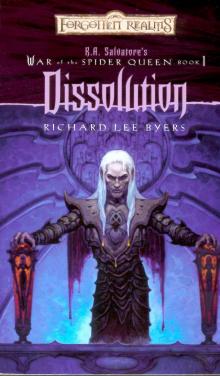 Dissolution
Dissolution Arkham Horror- Ire of the Void
Arkham Horror- Ire of the Void The Haunted Lands: Book II - Undead
The Haunted Lands: Book II - Undead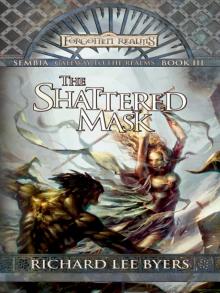 The Shattered Mask
The Shattered Mask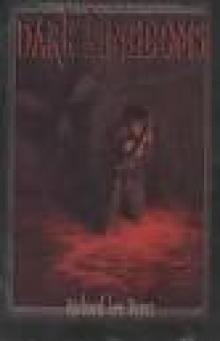 Dark Kingdoms
Dark Kingdoms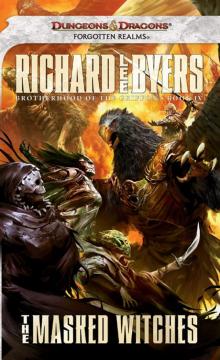 The Masked Witches: Brotherhood of the Griffon, Book IV
The Masked Witches: Brotherhood of the Griffon, Book IV The Plague Knight and Other Stories
The Plague Knight and Other Stories Unclean: The Haunted Lands
Unclean: The Haunted Lands The Captive Flame: Brotherhood of the Griffon • Book 1
The Captive Flame: Brotherhood of the Griffon • Book 1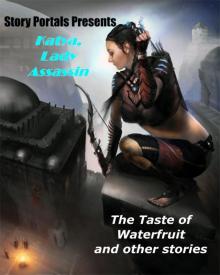 The Taste of Waterfruit and Other Stories (Story Portals)
The Taste of Waterfruit and Other Stories (Story Portals)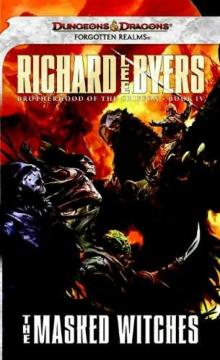 The masked witches botg-4
The masked witches botg-4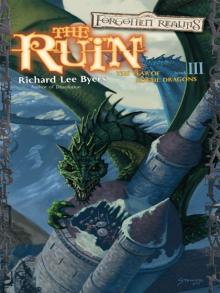 The Ruin
The Ruin The Spectral Blaze botg-3
The Spectral Blaze botg-3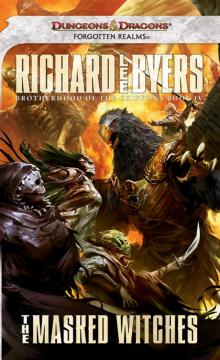 The Masked Witches
The Masked Witches Blind God's bluff bf-1
Blind God's bluff bf-1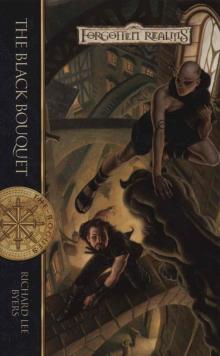 The Black Bouquet r-2
The Black Bouquet r-2 The Rite
The Rite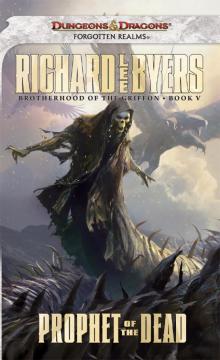 Prophet of the Dead: Forgotten Realms
Prophet of the Dead: Forgotten Realms The Shattered Mask s-3
The Shattered Mask s-3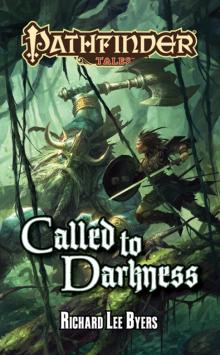 Called to Darkness
Called to Darkness Undead hl-2
Undead hl-2 Blind God's Bluff: A Billy Fox Novel
Blind God's Bluff: A Billy Fox Novel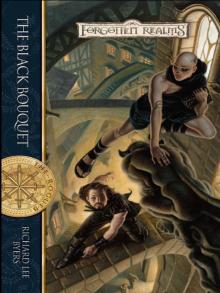 The Black Bouquet
The Black Bouquet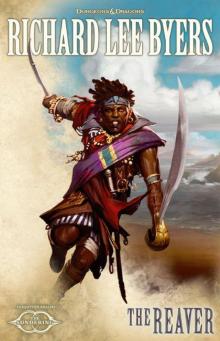 The Reaver
The Reaver The Spectral Blaze: A Forgotten Realms Novel
The Spectral Blaze: A Forgotten Realms Novel Queen of the Depths
Queen of the Depths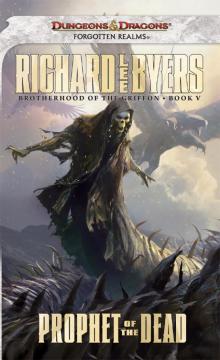 Prophet of the Dead botg-5
Prophet of the Dead botg-5 Whisper of Venom: Brotherhood of the Griffon, Book II
Whisper of Venom: Brotherhood of the Griffon, Book II The Captive Flame botg-1
The Captive Flame botg-1 The Haunted Lands: Book III - Unholy
The Haunted Lands: Book III - Unholy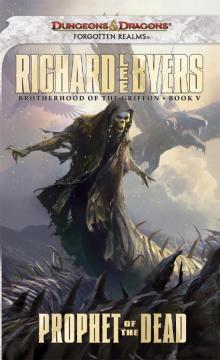 Prophet of the Dead
Prophet of the Dead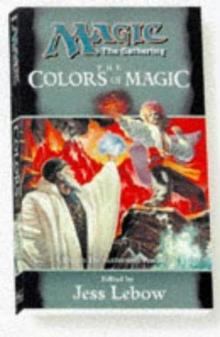 The Colors of Magic Anthology (magic: the gathering)
The Colors of Magic Anthology (magic: the gathering) Unholy hl-3
Unholy hl-3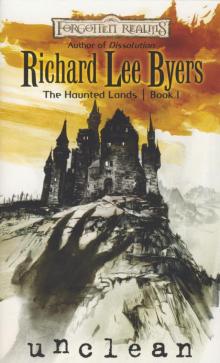 Unclean hl-1
Unclean hl-1 Blind God's Bluff
Blind God's Bluff Whisper of Venom botg-2
Whisper of Venom botg-2 The Spectral Blaze
The Spectral Blaze